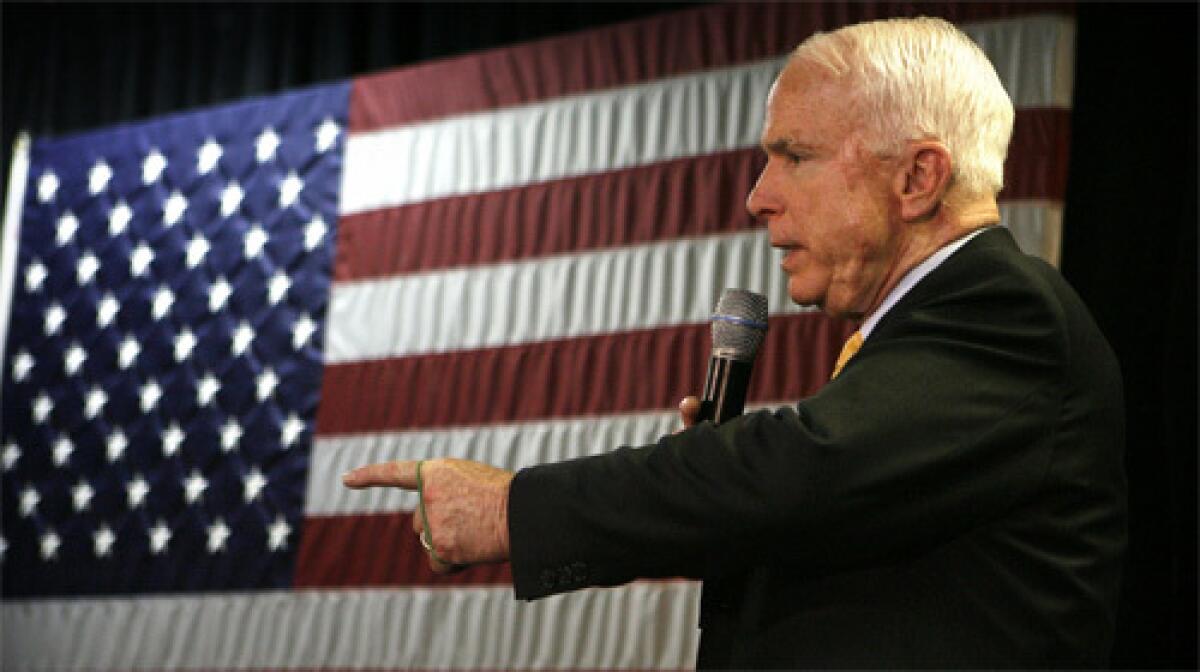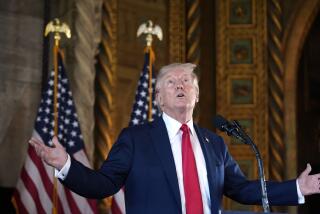McCain hopes his past is ahead of him

- Share via
HOLLIS, N.H. — Gray-haired veterans in narrow VFW caps dotted the crowds, pledging their undying allegiance. Independent voters quibbled and complained about concerns on some policy details, then said they would sign on, all the same. Reporters fought for the few seats at bull sessions in the back cabin of the “Straight-Talk Express.”
Sen. John McCain campaigned in New Hampshire on Friday, buoyant, smiling and more than happy to have local officials, voters and journalists wondering: Is this 2000 all over again?
The Republican presidential candidate clearly feels his moment is at hand, predicting (with a few cautions) that he will capture Tuesday’s presidential primary here, as he did eight years ago, and use the victory to resuscitate a campaign that many had given up for dead.
In an early-morning television interview, McCain compared himself to the biblical Lazarus, raised from the dead. Practically swallowed up by a huge knot of reporters and cameras outside the Hollis Pharmacy & General Store, he suggested he had “put the old lightning back in the bottle.” Before jumping back on his blue-and-silver bus, he offered to help a reporter searching for a way to characterize his new standing in New Hampshire. “How about ‘The Mac is back?’ ” he offered. “How about that?”
McCain’s new effervescence stemmed not only from the strong crowds of voters and reporters who followed him here but from the knowledge that his chief New Hampshire rival -- former Massachusetts Gov. Mitt Romney -- had been deflated by his disappointing second-place finish in Thursday’s Iowa caucuses.
Even as he reclaimed his campaign mojo, though, the Arizona senator was quick to caution that “we’ve got a long way to go.” And independent observers said many challenges remained: Polls showed he had drawn even with, but still not passed, Romney in New Hampshire. Aides touted newly energized fundraising, though they did not provide specific figures. And the last official reports showed McCain’s treasury to be considerably smaller than that of Romney or of former New York Mayor Rudolph W. Giuliani.
‘Straight-talk’ appeal
Still, McCain has staked his presidential bid on New Hampshire (and spent more time here than any other Republican) for a reason: His “straight-talk” appeal has a history of winning voters, particularly independents who can vote in either party primary.
At his first stop Friday, at the quaint Hollis pharmacy, McCain had so many reporters and potential supporters in tow that he could barely be seen above the crowd. He shook hands, signed autographs and made brief remarks.
Chris Hyde, 49, an electrical engineer, said he had voted for McCain in the 2000 primary and was leaning toward “coming back to him” after looking at others like actor and former Tennessee Sen. Fred Thompson (“a flash in the pan”) and former Massachusetts Gov. Mitt Romney (“a poll-driven guy.”)
“Needless to say, McCain has been on more a straight path, consistent, all the way through,” Hyde said. “From a character standpoint you have got to like that a lot.”
McCain got similar reactions the night before at a town-hall meeting in Derry. He had left Iowa about the time the caucuses there were opening and was back on the ground in New Hampshire ahead of most of the other candidates.
He seemed to disarm Derry with a few well-worn jokes, including the one about a $3-million government program to study the fertility of bears in Alaska. “I don’t know if that was a paternity issue,” McCain said, “or a criminal issue.”
He welcomes banter
But it was by welcoming spirited exchanges with some of his questioners that McCain set himself apart from other candidates and won over some in the audience.
Antiwar activist David Tiffany, 60, repeatedly challenged McCain about his “open-ended commitment” to Iraq. As the men engaged in a tit-for-tat that lasted several minutes, McCain said he would keep troops in the divided country for 100 years if needed to provide stability. Tiffany agreed they would not come to common ground but credited McCain with letting Tiffany have his say.
Looking on was Michel Biedermann, 47, a political independent who said he was impressed enough to consider voting for McCain, even though he leans Democratic. “It would have been very easy for him to give a pat answer about the war, turn around and take somebody else’s questions,” Biedermann said.
Others here have already been converted. At a recent Concord house party, Ron Rompala, 54, said he had been disturbed by McCain’s stance on immigration, but then reassured when the candidate seemed willing to understand people’s fears about the issue.
“He came out and said, ‘I screwed up.’ That helped,” said Rompala, a nutritionist. “So I’ll go with the horse I did eight years ago.”
Dick Bennett, a pollster and veteran political watcher here, said that focus groups showed McCain’s comeback began around Thanksgiving, as voters became disillusioned with the other Republican choices and began to give the candidate another look.
“What voters said eight years ago and they are telling us now is that, when they see McCain, he listens to them, he seems to understand them and he provides an honest answer,” Bennett said. “Even if they don’t agree with it, they feel like he is being real. It’s pretty remarkable political theater.”
The comeback has been so pronounced that focus-group participants have even stopped talking about “tired old John McCain,” said Bennett, and begun to describe him as “looking younger, looking more vital.” Bennett added with a chuckle: “It’s interesting how that perception can change, basically almost overnight.”
Spirit of 2000
Even a new “closer” advertisement that the campaign aired on television Thursday appealed to the spirit of 2000.
“Eight years ago, New Hampshire stunned the political world,” McCain says in the spot. “You turned convention on its head because you didn’t care what the experts or the media said.” Calling himself better prepared than in 2000, McCain concludes: “Once again, I need your help.”
But throughout the day Friday, McCain also sought to allay concerns -- and accusations from Romney at the start of the day -- that his repeat candidacy merely affirmed he was part of an old guard that prevented change in Washington.
McCain argued he had repeatedly fought the status quo, including unchecked campaign-finance spending and pork barrel projects like the $233-million “bridge to nowhere” in Alaska.
In a new twist Friday, McCain argued that even his stand in favor of the Iraq war burnished his credentials as a maverick and an agent of change. He said he had criticized former Defense Secretary Donald H. Rumsfeld’s handling of the war and argued that more troops were needed to get the job done.
“I was one of the strongest and earliest supporters of the change that has taken place that has allowed us to succeed in Iraq,” McCain told reporters on his bus late in the day, referring to the buildup of troops that he said had helped reduce violence. “There can’t be a more important change than that of saving brave young American lives.”
By the end of a long day Friday, McCain was at his familiar position in the back of his campaign bus, regaling journalists with stories and opinions, just as he had in 2000. Back then, the freewheeling discussions became such a hot ticket that media executives flew in from New York and Washington to join in.
On Friday, when he wasn’t objecting to the use of the torture technique waterboarding or expressing concern about the new statistics showing an increase in joblessness, McCain was bemoaning the effect of pay-per-view telecasts on boxing.
He also suggested that his celebrity endorser, actor Wilford Brimley, would be a fair match for former Arkansas Gov. Mike Huckabee’s celebrity tout, Chuck Norris.
More to Read
Sign up for Essential California
The most important California stories and recommendations in your inbox every morning.
You may occasionally receive promotional content from the Los Angeles Times.














